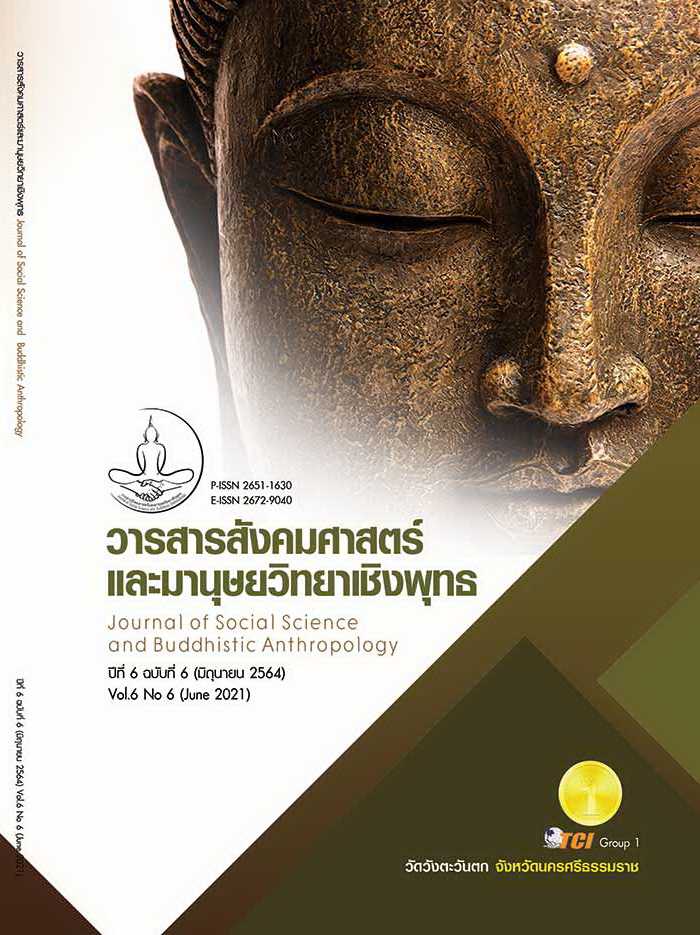THE STUDY OF LESSON DISTILLED FROM COMMUNITY-BASED TOURISM MANAGEMENT TO DEVELOPING COMMUNITY TOURISM PROTOTYPE: A CASE STUDY OF BAN POO TER COMMUNITY, MAE KU SUBDISTRICT, MAE SOT DISTRICT, TAK PROVINCE
Keywords:
A Lesson Distilled Community Development, Tourism Development Model, Ban Poo Ter CommunityAbstract
The objectives of this research article were to: 1) analyze a community through the context of capability and readiness to advance into a model community in community - based tourism 2) create knowledge and comprehension while distilling the body of knowledge regarding the management process so that they are well-prepared before becoming the model community, and 3) summarize the lessons concerning community-based tourism management in the hope to adapt to the development of the model community. This research is a qualitative study that utilizes lessons learned from participatory action research. The population and target groups are 30 distinguished scholars and 57 experts. Research instruments include in-depth interview, observation, record and evaluation. The accumulated data had been synthesized and presented as descriptive analysis. The results revealed that 1) Ban Pu Ter community is appealing due to the close connection between local people and elephants. Thus, elephant husbandry intellect should be encouraged to distinguish them from other communities; 2) all involved parties must have a mutual understanding of teamwork while fully participating in every step of the process. The development of tourism and locality must be practical and proceed in all aspects to build a solid foundation and competent cultural capital; 3) the value of the community and the area are concluded through four dimensions: societal culture, communal environment, community - based economic, and knowledge in the community. In addition, it can determine the guidelines for the tourism development of the community to be cultural tourism and local identity (the way of happiness).
References
กระทรวงการท่องเที่ยวและกีฬา. (2559). แนวทางการส่งเสริมการท่องเที่ยว. เรียกใช้เมื่อ 5 กุมภาพันธ์ 2564 จาก https://www.mots.go.th/
ปฐม หงส์สุวรรณ และนิ่มนวล จันทรุญ. (2560). การจัดการหมู่บ้านทอผ้าอีสานเพื่อพัฒนาเส้นทางการท่องเที่ยว เชิงวัฒนธรรมเชื่อมโยงระหว่างจังหวัดขอนแก่นและจังหวัดมหาสารคาม. ใน รายงานวิจัย. มหาวิทยาลัยมหาสารคาม.
วารุณี พงษ์ภิญโญ. (2548). ปัจจัยที่มีอิทธิพลต่อการใช้องค์ความรู้และภูมิปัญญาท้องถิ่นด้านเกษตรกรรม เพื่อสร้างความเข้มแข็งทางเศรษฐกิจชุมชน ในภาคตะวันออกเฉียงเหนือตอนล่าง ของประเทศไทย. วารสารการพัฒนาชุมชนและคุณภาพชีวิต, 4(2), 188-199.
วิรัตน์ ตราดรรชนี. (2560). รักษ์สามเส้า คน-ช้าง-ป่า. เรียกใช้เมื่อ 5 กุมภาพันธ์ 2564 จาก https://www.bangkokbiznews.com/news/detail/744755
ศิรินทิพย์ ธิติพงศ์วณิช. (2552). ปัจจัยที่ส่งผลต่อการจัดการความรู้ เรื่องภูมิปัญญาท้องถิ่นในการจัด การศึกษาของสถานศึกษาขั้นพื้นฐาน สังกัดสำนักงานเขตพื้นที่การศึกษาเพชรบุรี เขต 2. ใน วิทยานิพนธ์ครุศาสตรมหาบัณฑิต สาขาวิชาการบริหารการศึกษา . มหาวิทยาลัยราชภัฏเพชรบุรี.
สายัณห์ ภัทรเกียรติทวี. (2561). แนวทางการพัฒนาการท่องเที่ยวเชิงวัฒนธรรมโดยชุมชน บ้านปูเต้อ ตำบลแม่กุ อำเภอแม่สอด จังหวัดตาก. ใน วิทยานิพนธ์ศิลปศาสตรมหาบัณฑิต สาขาวิชาการจัดการภูมิวัฒนธรรม. มหาวิทยาลัยศรีนครินทรวิโรฒ.
สำนักงานสภาพัฒนาการเศรษฐกิจและสังคมแห่งชาติ. (2559). ร่างแผนพัฒนาเศรษฐกิจและสังคมแห่งชาติ ฉบับที่ 12 (พ.ศ. 2560 - 2564). เรียกใช้เมื่อ 5 กุมภาพันธ์ 2564 จาก https://www.nesdc.go.th/ewt_w3c/ewt_news.php?nid=5958&filename=
สำนักงานสภาพัฒนาการเศรษฐกิจและสังคมแห่งชาติ. (2563). ยุทธศาสตร์ชาติ. เรียกใช้เมื่อ 5 กุมภาพันธ์ 2564 จาก http://nscr.nesdb.go.th/wp-content/uploads/2020 /10/Oct20_full.pdf
สุภัทธา สุขชู. (2551). ททท. บนทางแพร่งระหว่างสร้างสรรค์กับทำลาย. เรียกใช้เมื่อ 6 กุมภาพันธ์ 2564 จาก http://info.gotomanager.com/news/printnews.aspx?id=71829
อังค์ริสา แสงจำนงค์. (2559). ความท้าทายของชุมชนเชิงมรดกทางวัฒนธรรมต่อการพัฒนาแหล่งท่องเที่ยวอย่างยั่งยืน. วารสารกระแสวัฒนธรรม, 9(16), 81-91.









